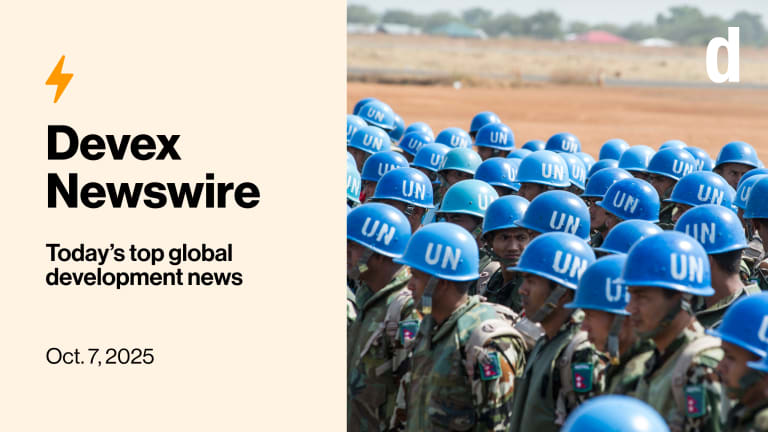
This is a preview of our daily Newswire. Sign up to this newsletter to receive an inside look at the biggest stories in global development.
All New Yorkers over 30 can get COVID-19 vaccines as of Tuesday morning, while in the Philippines — where less than 0.5% of the population had been inoculated as of last week — Metropolitan Manila is in lockdown, with most intensive care units 70% to 100% occupied.
TRIPPED UP
UNAIDS Executive Director Winnie Byanyima wants the World Bank to take a stand on intellectual property waivers to boost supplies of COVID-19 vaccines for lower-income countries, reports Jenny Lei Ravelo.
“The bank needs to align with us and support the waiver,” she said during a civil society event ahead of the 2021 World Bank Springs Meetings. The World Bank’s representative at the session, Muhammad Pate, could not say exactly where the institution stands.
Lower-income countries and advocates have struggled to secure support from wealthier countries for a proposal to waive intellectual property protections on COVID-19 vaccines and treatments. Newly installed WTO Director-General Ngozi Okonjo-Iweala has tried to overcome the impasse with her own proposal.
Low vaccine coverage across the world is expected to fuel the rise of new vaccine-resistant variants, which is likely to mean new vaccines are needed within a year, according to a recent survey of virologists and epidemiologists.
Produced in partnership: Opinion: Gender data — the fuel to power generational change on gender equality
Data does more than set benchmarks and measure progress; it can be an engine for change. UN Women’s Sarah Hendriks explains how new “action coalitions” will help achieve gender equality.
In a Spring Meetings “curtain raiser” speech on Monday, World Bank President David Malpass said that countries that have not yet begun vaccination programs for COVID-19 should do so as quickly as possible, since some of these same countries are likely to face challenges with delivering vaccines to their populations.
VACCINE DIPLOMACY
“The State Department was initially expecting more than 300,000 vaccines back in December. We got 13,000, and it’s been playing catch-up ever since,” Secretary of State Antony Blinken said at a virtual town hall meeting with staff of the U.S. Mission to the U.N. About 80% of the State Department’s vaccine allotment has been sent to U.S. missions overseas, Blinken added.
USAID announced Monday that the U.S. will co-host a virtual “investment opportunity” for COVAX, the vaccine distribution platform. The event on April 15 will aim to use the Biden administration’s $2 billion commitment to Gavi, the Vaccine Alliance to encourage other donors to follow suit with contributions.
ORIGIN STORY
A lengthy report from the World Health Organization, released today and presenting the findings of WHO’s mission to Wuhan, China earlier this year, sheds little new light on the origins of the COVID-19 virus. The report was subject to approval by Chinese authorities, and is based largely on China’s own research.
The report reiterates that COVID-19 likely spread from bats to humans via another small mammal. It repeats that it is “extremely unlikely” the virus escaped from a lab and dismisses speculation it was deliberately engineered.
The authors ranked four scenarios in order of likelihood and recommended further research into all of them, including the very low probability hypothesis that the virus spread to humans from the packaging of “cold-chain” food products.
Asked whether China should face “punitive” measures for its handling of the virus, U.S. Secretary of State Blinken said Sunday that the focus should be on “building a stronger system for the future.”
FOOD PROCESSING
Plans are coming together for the first-ever United Nations Food Systems Summit in September, meant to unite multiple sectors around food systems transformation in the final decade of the 2030 Sustainable Development Goals, Teresa Welsh reports. While organizers say they are working “to create an orchestra out of a cacophony,” some civil society groups worry that power imbalances in the food system are also showing up in preparations for the event.
Read Teresa’s behind-the-scenes look at food’s main event.
Devex Pro: Lisa Cornish reports on Australia’s effort to improve its climate change image by becoming a global leader in agriculture.
FIELD REPORT
Kenya’s farmers face a range of livelihood challenges, capped off by desert locust invasions and the COVID-19 pandemic. But they’ve found an ally in a highly nutritious “wonder grass” that boosts productivity and preserves soil fertility, David Njagi reports for Devex.
IN THE NEWS
An estimated 2,500 Karen ethnic people fled to Thailand following a series of Myanmar military airstrikes that began Saturday, but were allegedly turned away at the border by Thai soldiers. [AP]
Speaking at a virtual U.N. Security Council meeting, Blinken on Monday appealed for more border crossings into Syria to allow aid delivery to millions of people. [France 24]
WHO chief Tedros Adhanom Ghebreyesus and 24 heads of state signed a joint letter calling for a global treaty on pandemics to help the world deal with future health crises. [The Guardian]
Sign up to Newswire for an inside look at the biggest stories in global development.








